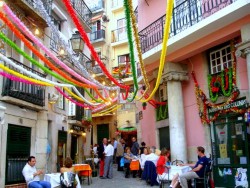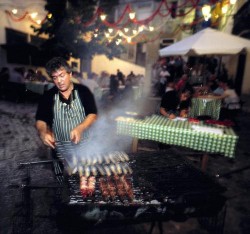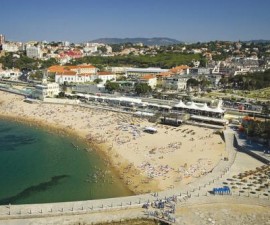Cities and urban areas all over Portugal are known for their love of celebrations. Festivals and events are the signposts by which the Portuguese navigate their way through the year and Lisbon is home to one of the biggest of them all.
The Santo Antonio Festival takes place in Lisbon every year in June, usually 12th and 13th of the month. It is a celebration of Portugal’s patron saint, Santo Antonio, to whom many miracles have been attributed.
He is considered to be many extraordinary things, most commonly the keeper of lost things. However in Portugal he has a specific yet vast role, including that of a defender of animals, a healer, the guardian of good marriages and the protector of the souls of purgatory.
Santo Antonio was born in Lisbon in 1195, named Fernando Martins de Bulhoes. He was born into a family of nobility and against his parents’ wishes decided to enter the Augustinian Abbey of St Vincent to study scripture and Latin classics.
After becoming a priest he went on to preach the gospel with a group of Franciscan monks and toured Italy to huge acclaim for his sermons and teaching of the gospel.
Santo Antonio was canonised by the Catholic Church on June 13 1232, just one year after his death, making it the second-fastest canonisation in history. It is not clear how the celebration of Santo Antonio converted itself into such a large-scale event, although he was of course a favoured son of the city of Lisbon.
But what we do know is that these days Lisbon comes alive for several days around the 13th of June in a party that is almost unmatched by another in Portugal’s festival-filled calendar.
So if you are thinking of timing your visit to Lisbon to coincide with the Santo Antonio Festival, what exactly can you expect?
Preparations begin several days before the party proper takes place. The entire city becomes awash with colourful decorations, twinkling lights and food and drink stalls that will soon be working overtime to feed the thousands who will flock to enjoy the street-side festivities.
The music, colour and dancing set in long before the party proper begins, creating an atmosphere of excitement and expectation that permeates the city’s bustling streets.
Each of the districts within the city has a different role to play during the Santo Antonio Festival. Some will play host to music events and street parties, while the main activities are concentrated in the traditional neighbourhoods from the Alfama to Castelo.
Within these old squares and narrow streets, Lisbon’s many restaurants prepare to serve their famous ‘caldo verde’ (green soup) to revellers for several days on end, alongside fragrant grilled sardines and lashings of beer, sangria and exotic concoctions. Food and drink are enjoyed against the backdrop of ‘arraial’ folk music, which is appreciated by old and young alike.
Traditional Pimba music is the order of the day in the Graca district, while the younger generation tend to head over to Bica and Miradouro de Santa Catarina as the party progresses, to dance until dawn to electronic music which has its roots firmly in the 21st century.
The Santo Antonio Festival is characterised by the tradition of the ‘Noivas de Santo Antonio’, (the Brides of Saint Anthony), when hundreds of Lisbon couples make the most of the occasion to get married and celebrate their nuptials with one of the biggest parties imaginable.
Here, under the flood of streamers and balloons, the happy couples dance on the cobbles, drink to their futures and receive gifts of sweet basil to bring them good luck and fortune.
The nuptials usually take place alongside the many masses which are held in Santo Antonio’s honour and underline the saint’s importance in Portugal’s folklore as a counsel of married couples.
The build up to the Santo Antonio Festival takes place over the course of several days before the city reaches a crescendo of excitement on the night of 12th June. Revellers party until the sun rises before heading home to sleep off the excesses of the night before. 13th June is a public holiday in Lisbon and is the official day of Santo Antonio.
If you have the energy after the festivities, head out in the early morning sunshine to wander through the now deserted streets of Portugal’s capital. It is rare that you will have the opportunity to have the cobbles, facades and monuments to yourself, but while the rest of Lisbon sleeps, this is one such occasion.






